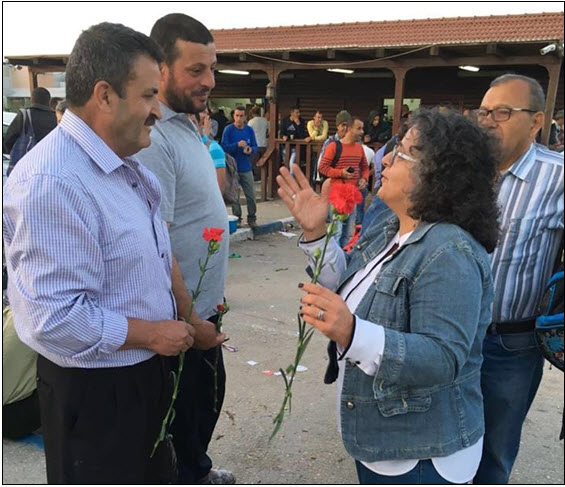According to the front page of Yediot Ahronot published on Sunday, May 1, President Reuven Rivlin is inclined to commute the prison sentence of former President Moshe Katsav due to a “serious deterioration of the former president’s health.” However, a statement issued from the President’s Office indicated that no formal request has been received and that, if it arrives, the president will give it the same consideration he gives all such requests, in full consultation with the relevant authorities. Far-right Justice Minister Ayelet Shaked is on the record as supporting a reduction in sentence for Katzav, who served as Israel’s eighth president from 2000 to 2007, but who was convicted of rape and other sexual offenses five years ago.

Hadash MK Aida Touma-Sliman at Eyal checkpoint, north of Kalkilya, on May Day last Sunday (Photo: Al Ittihad)
Katsav, a leading figure in the Likud party, was found guilty of two counts of rape, one count of committing an indecent act using force, a single count of committing an indecent act, two counts of sexual harassment, one count of harassing a witness, and a single count of obstructing justice. He entered Ma’asiyahu Prison in Ramle in December 2011. According to media reports, the former president’s physical and mental condition has significantly deteriorated following a parole board’s recent rejection of his request. The board adopted the prosecution’s position regarding the issue of regret – officially revealed in the published portion of the decision (some parts of which were not published) – that Katsav could not be released early since no sexual offender has ever been granted an early release from prison without first having expressed regret for his crimes. It has been reported that Katsav still behaves as if no legal proceedings were ever conducted against him and acts like someone who has not undergone any treatment connected to the crimes he committed.
Hadash MK Aida Touma-Sliman (Joint List), chairwoman of the Knesset Committee for the Advancement of the Status of Women and Gender Equality, has said she opposes a pardon and asked President Rivlin to reject any such request, making clear a zero tolerance for sexual violence. “Just two weeks ago the parole board, which is professional in its makeup and character, decided not to [shorten Katsav’s sentence] because he did not express remorse and was not willing to undergo any rehabilitative or educational process,” she said. “It’s clear to me that his family and lawyers will use any excuse to ask for a pardon, but the Prison Service has a professional staff that can evaluate his mental situation and give him the help he needs, paid for by the state, something his victims did not receive.”


